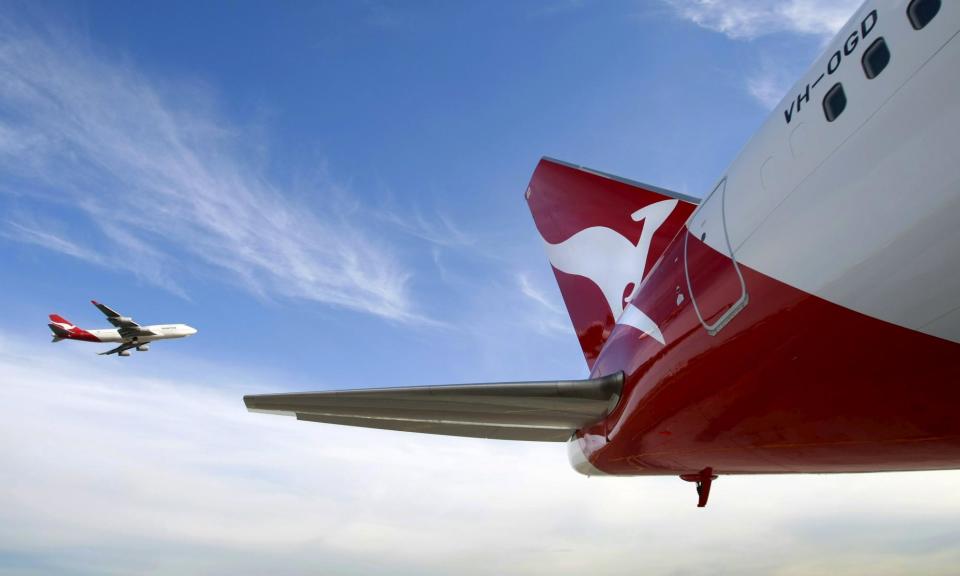Qantas frequent flyer changes: how does the revamped system work and who benefits?

Qantas has unveiled long-awaited changes to its frequent flyer program, boosting the number of reward seats available and changing the way those seats are priced. What does Monday’s announcement mean for its 15.2 million frequent flyer members and who stands to benefit the most?
What are the changes?
The carrier has created more than 20m additional rewards seats on international and domestic routes across economy, business and first class fares, the pricing of which will vary in line with flight demand. Under the new Classic Plus Flight Rewards system, peak air fares mean higher points costs and vice versa.
The change, which the Qantas chief executive, Vanessa Hudson, said was one of the biggest expansions the carrier has made to the program in its 35-year history, gives customers more price transparency, with one frequent flyer point effectively carrying a fixed value of 1¢ for economy flights and 1.5¢ for business class flights.
Value wise, Classic Plus delivers an option halfway between Classic and Points Plus Pay seats, according to Daniel Sciberras, the editor-in-chief of Point Hacks.
“This new category is going to be fluctuating, depending on the price of the fare, but at a fixed rate of value – and it’s there to bridge the huge gap,” he said.
When do the changes come into effect?
Classic Plus bookings for international flights from 1 July are available from today. Domestic flights will follow later in the year.
Is this an improvement?
Five times more rewards seats are now available, which goes some way towards addressing longstanding criticism that the airline has too few Classic rewards seats. But that availability comes at a cost – Classic Plus seats will usually be more expensive, points-wise, to book than the popular but hard-to-find Classic seats.
Matt Graham, the editor of Australian Frequent Flyer, said: “Qantas had to do something because there have been a lot of complaints that people have a lot of points that they can’t use.” He added that he found the change underwhelming.
For those who have been accumulating points more successfully than they have been able to secure Classic bookings, the new offering gives them a way to spend points beyond the poor value and inflexible Points Plus Pay ($0.6c a point) and Qantas shop (about $0.5c a point) options. In some cases, Classic Plus offers similar or better value than Classic seats, such as for on-sale flights.
For Sciberras, the move is “definitely a plus, because they’re not taking anything away. It’s complementary to what already existed.”
Both he and Graham said they would look for Classic deals before turning to Classic Plus.
How does Classic Plus compare with Classic rewards?
Qantas has been open about Classic Plus generally being costlier than Classic. In many cases, that difference is large, particularly for premium long-haul flights, according to Graham.
“For those aspirational redemptions that most members save their points for, the cost is going to be substantially higher,” he said.
Take the example of a return flight from Sydney to Dallas, Texas. Graham found a Classic business class off-peak seat costing 253,000 points plus $675 taxes and fees. The same flight for Classic Plus customers cost 1,165,800 points plus $1,302 taxes and fees.
Points Plus Pay delivered the least value and flexibility, costing 3,131,167 points.
Both Classic and Classic Plus offer good flexibility. Unlike Classic, Classic Plus flights can be upgraded to first class.
The system has its quirks – Graham said he had found dates on which premium economy Classic flights cost fewer points than Classic Plus economy flights, as well as return flights that were cheaper than one-way options.
How does this affect Classic rewards?
It doesn’t. The existing 5m Classic seats remain unchanged.
Who stands to gain most from the changes?
Those who have a surplus of points and miss out on the small number of Classic seats. And almost half a million Qantas Business Rewards members.
“If you’re a business owner and you’ve got a large credit card spend, you can be earning millions of points every year,” Graham said. “They just want to be able to take their family on holiday once a year and this is a way they’ll be able to find availability much more easily.”
How does Qantas frequent flyer now stack up against other reward programs?
“Qantas is one of the world leaders [in loyalty programs], they know how to engage their members so well,” Sciberras said.
Related: ‘This is a game-changer’: Australia, once home of glamour flying boats, eyes a seaplane revival
Graham said he had hoped Qantas would release more Classic seats and introduce a Singapore Airlines-style second tier option, which is priced about 50% higher than its usual points rate but offers more availability.
“It’s very hard to get outsized value from the program when the points are fixed at a certain rate,” he said. “It removes some of the gaming element of trying to get more value out of your points.”
How important is the airline’s loyalty program?
Very, and increasingly so. Qantas’ Loyalty division is one of the company’s most lucrative areas year-on-year, especially at the height of the Covid epidemic The key is for the company to keep its members engaged, according to Sciberras, who believes the change “is probably going to be an overall good thing for Qantas”.
Will this help the brand after a bad year?
“Anything they can do which is good news of course is welcome … they want to show they are listening to customers,” Graham said.
The changes to the loyalty program follow a tumultuous period for the company but would have been in the making for many months, if not years, Sciberras said.

 Yahoo Finance
Yahoo Finance 